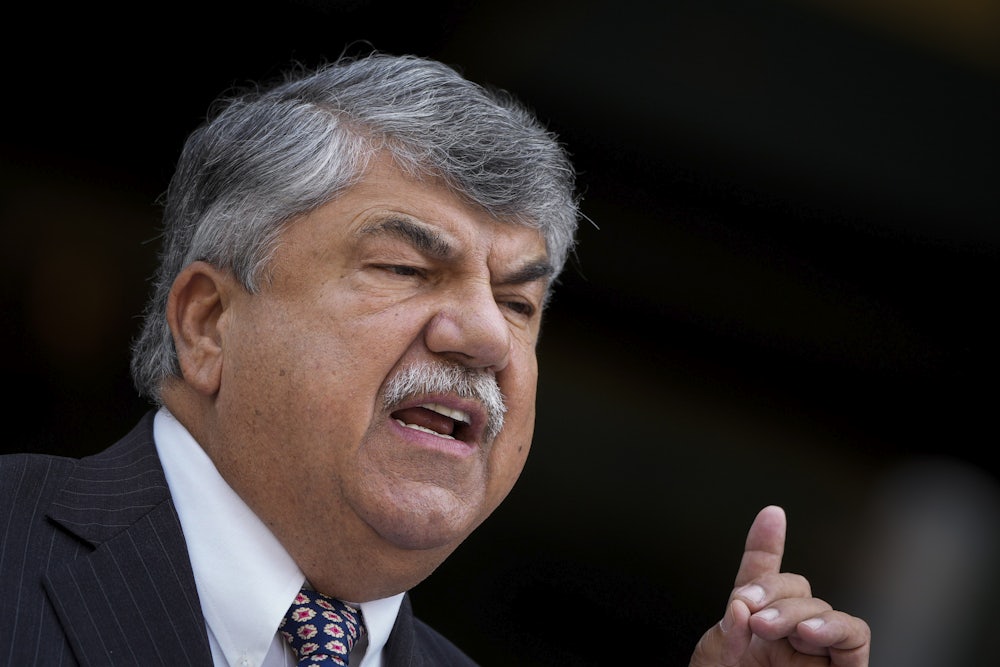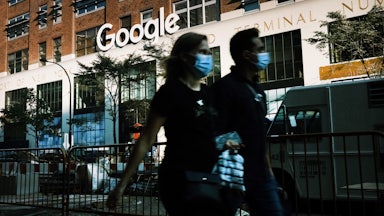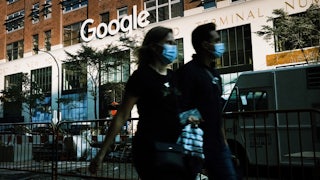Liberals, said Richard Trumka, his lip curling. They’re killing us. That was about 10 years ago. We were standing in the conference room of The New Republic’s old Washington office, and though it was hardly news that organized labor no longer felt it could count on liberals—I’d written as much in a book about income inequality—it surprised me that Trumka would say so while situated inside a liberal sanctum sanctorum. And anyway, Trumka was a pretty mainstream liberal himself.
Liberalism’s diminished interest in securing a future for organized labor is by far its biggest problem, and like most persistent problems, it’s one that almost nobody wants to face. Trumka, who died Thursday from a heart attack, had the misfortune to become president of the nation’s largest labor federation, the AFL-CIO, in 2009, when the job was to manage decline. He performed it with characteristic decency and intelligence. But he—and labor—were cut out for bigger things.
It took me slightly aback to read in the obits that Trumka was only 72, because he’d been a leader in the labor movement for about as long as I can remember. Trumka was still in his early thirties when first elected president of the United Mine Workers of America. Born in 1949 in a small town in the mountains of western Pennsylvania coal country called Nemacolin, he’d already worked seven years in the mines, put himself through law school, and joined the Miners for Democracy movement. In those days, it took guts for a mine worker to associate himself with reformers: Jock Yablonski, Tony Boyle’s unsuccessful challenger for the UMWA presidency, paid with his life, assassinated by Boyle’s thugs on New Year’s Eve 1969. (Boyle was later sent to prison for conspiring to kill Yablonski.) Arnold Miller, elected UMWA president after a federal judge threw out Boyle’s 1969 reelection, initiated important reforms, but it wasn’t really until Trumka took the reins in 1982 that the UMWA cleaned itself up. Kicked out of the CIO in the 1930s and the AFL in the 1940s, the UMWA finally rejoined the now-conjoined AFL-CIO after Trumka became UMWA president.
It’s a mark of labor’s diminished visibility that Trumka was much better known in the 1980s as president of the UMWA—even among people who didn’t particularly follow labor news—than he was in the far more exalted position of AFL-CIO president starting in 2009. The proportion of U.S. workers who were union members exceeded 20 percent when Trumka became UMWA president; by the time he became AFL-CIO president, it was about 12 percent. There are various reasons for the decline, none of them having much to do with the leadership of Richard Trumka or anybody else. Governmental policy strangled the union movement, most especially the 1947 Taft-Hartley amendments to the National Labor Relations Act, passed two years before Trumka was born. And anyway, after Trumka became AFL-CIO president, union density’s decline mostly halted, even as the Supreme Court weakened labor rights and Republican state legislatures passed right-to-work laws that made union membership more difficult to sustain.
Trumka ran the AFL-CIO with the same plainspokenness he displayed that day in TNR’s offices. In an October 2008 speech before the United Steelworkers in Las Vegas, he confronted head-on the racism of white union members who didn’t want to vote for Barack Obama. “There’s not a single good reason for any worker, especially any union member, to vote against Barack Obama,” he said. “And there’s only one really bad reason … and that’s because he’s not white.”
Trumka talked in that speech about going back to Nemacolin and hearing an elderly Democratic activist he knew say, “There’s no way that I’d ever vote for Obama.” When he asked why, she said, “Well, he’s Muslim.” Trumka told her Obama was a Christian, and anyway, “So what if he’s Muslim?” Then she said, “He won’t wear that American flag pin on his lapel.” Trumka pointed out that he wasn’t wearing one and neither was she, and that Obama had worn a flag lapel pin plenty of times. “Well, I just don’t trust him,” she said finally. He asked why not. “She drops her voice a bit. She said, ‘Because he’s Black.’”
Trumka told the woman to look around. This town is dying, he said. Our kids are moving away because there aren’t any jobs. Obama says he’ll fight for us. And you won’t vote for him because of his skin color? “Are you out of your ever-lovin’ mind, lady?”
“We can’t tap-dance around the fact that there’s a lot of folks out there just like that woman,” Trumka told the crowd. “And a lot of them are good union people.… Those of us who know better can’t afford to sit silently or look the other way while it’s happening.”
Eight years later, as rank-and-file union members flocked to Donald Trump, Trumka made clear not only that Trump wasn’t anyone the labor federation could support but also that he felt personal disgust for the man. “Trump wants to talk to people like you and me,” he said in January 2016, then recited instances of Trump’s amply documented bigotry and thuggery. “I’ve been around awhile,” Trumka said, “and I’ve heard that kind of thing before. Politicians trying to divide working people. Talking about us and them.”
Trumka was forthright to the end. On July 27, he was asked whether he supported a vaccine mandate. Many union leaders (including, surprisingly, the usually tough-minded Randi Weingarten of the American Federation of Teachers) have been hesitant to endorse such mandates, neglecting their responsibility to protect members’ health in deference to a few crank anti-vaxxers among the rank and file. Not Trumka. “Yes we do,” Trumka told C-SPAN. “If you come back in, and you’re not vaccinated, everybody in that workplace is jeopardized.” In the current climate, regrettably, a union leader who doesn’t dither about the need for vaccine mandates in the workplace is showing real gumption.
Liberals tended to treat Trumka with the same condescension they had for the labor movement generally. Isn’t labor’s time past? they’d ask. Isn’t the old adversarial model no good? (Never mind that Trumka’s predecessor, Walter Reuther, tried after World War II to sell corporate America on more cooperative European-style power-sharing and got nowhere.) Donald Trump insulted Trumka verbally, but Democratic presidents insulted him silently by extending little more than lip service. Departing from that pattern, President Joe Biden is more forthrightly pro-union than any president since Harry Truman. It’s a shame Trumka didn’t live long enough to find out where that may lead.
For the time being, Biden’s an outlier. We’re still waiting for the liberals who got on Trumka’s nerves to show some gumption themselves. Reviving the labor movement Trumka fought for is the only plausible way to reverse the four-decade increase in income inequality. If you aren’t for rebuilding labor, you aren’t for tackling inequality. If you think you are, really, you’re wasting your time. Trumka knew that, and he didn’t mind saying it—and many other uncomfortable truths—out loud.








